Showing 1–12 of 31 results

This authoritative sourcebook reflects the extensive contributions of K.R. Rao over sixty years of professional engagement, blending theory and empirical research, leadership and scholarship, and classical and contemporary perspectives of Eastern and Western thoughts in a trans-disciplinary setting.
Consciousnes, Gandhi and Yoga explores the cross-cultural and interdisciplinary Odyssey of K. Ramakrishna Rao spanning over a period of sixty years. Rao’s journey is a voyage of discovery of hidden treasures of consciousness in both the East and the West; and this volume is an authoritative sourcebook detailing and discussing that voyage by scholars from around the world. We find here reflections on the extensive contributions of K.R. Rao which contain a rare, and in some ways unique, blend of theory and empirical research, leadership and scholarship, and classical and contemp-orary perspectives of Eastern and Western thoughts in a trans-disciplinary setting.
Ramakrishna Rao has carried out extensive empirical research collecting data on hidden human potentials and is engaged in providing for them appropriate conceptual framework and theoretical base in cross-cultural consciousness studies. Further, he creatively anchors Gandhian thought and practices to the current developments in consciousness studies.
The authors include Prof. Rao’s colleagues and contemporaries scattered around the globe and experts in consciousness studies, Gandhian thought, Yoga and parapsychology. They provide interesting insights into the life and work of Prof. Ramakrishna Rao.
The present volume is offered as an academic tribute as Prof. Rao crosses the 80th milestone in life’s journey and completes sixty years of professional engagement as a teacher and researcher.

The authors share their concerns for peace, situating their sensuous / intellectual / spiritual experiences in a culture of peace. They show how education, individual responsibility, philosophy, Gandhian non-violence, Buddhist compassion, etc. can reinforce the culture of peace.
Over the rolling centuries, peace has been a major concern: in religions and, more often, within socio-political contexts. Yet, perhaps ironically, the world history is a long, uninterrupted story of wars and violence. Not long ago in the aftermath of Hitlers defeat, the inception of the United Nations held out hopes of a new, free-from-war world order, which the hostile scenario today belies! Is peace then a dream? A Utopian abstraction in a dehumanized, fragmented world, stock-piling all-devastating war machines? And can we possibly uphold the culture of peace amidst the growing cult of violence and blind consumerism, or in a climate of distrust, acrimony and intolerance? Addressed in this collection of essays are these and other related questions by some of the best minds from different countries of Asia. Cutting across narrow compartmentalizations of disciplines, the authors try to share, with wider audiences, their concerns for peace, situating their sensuous/intellectual/spiritual experiences in a culture of peace. Also identifying specificities in terms of peace-threat-ening issues, situations, geographical zones, the volume attempts to show how education, individual responsibility, philosophy, ethics, artistic creativity, collective spirituality, Gandhian non-violence, Sufis universal love, and the Buddhist message of compassion and equanimity can reinforce the culture of peace even in the face of despair. This volume 6th in the Culture and Development series is essentially the assemblage of essays presented at the Asian Conference on The Culture of Peace: the Experiences and the Experiments, held on 25-29 November 1996 in New Delhi.
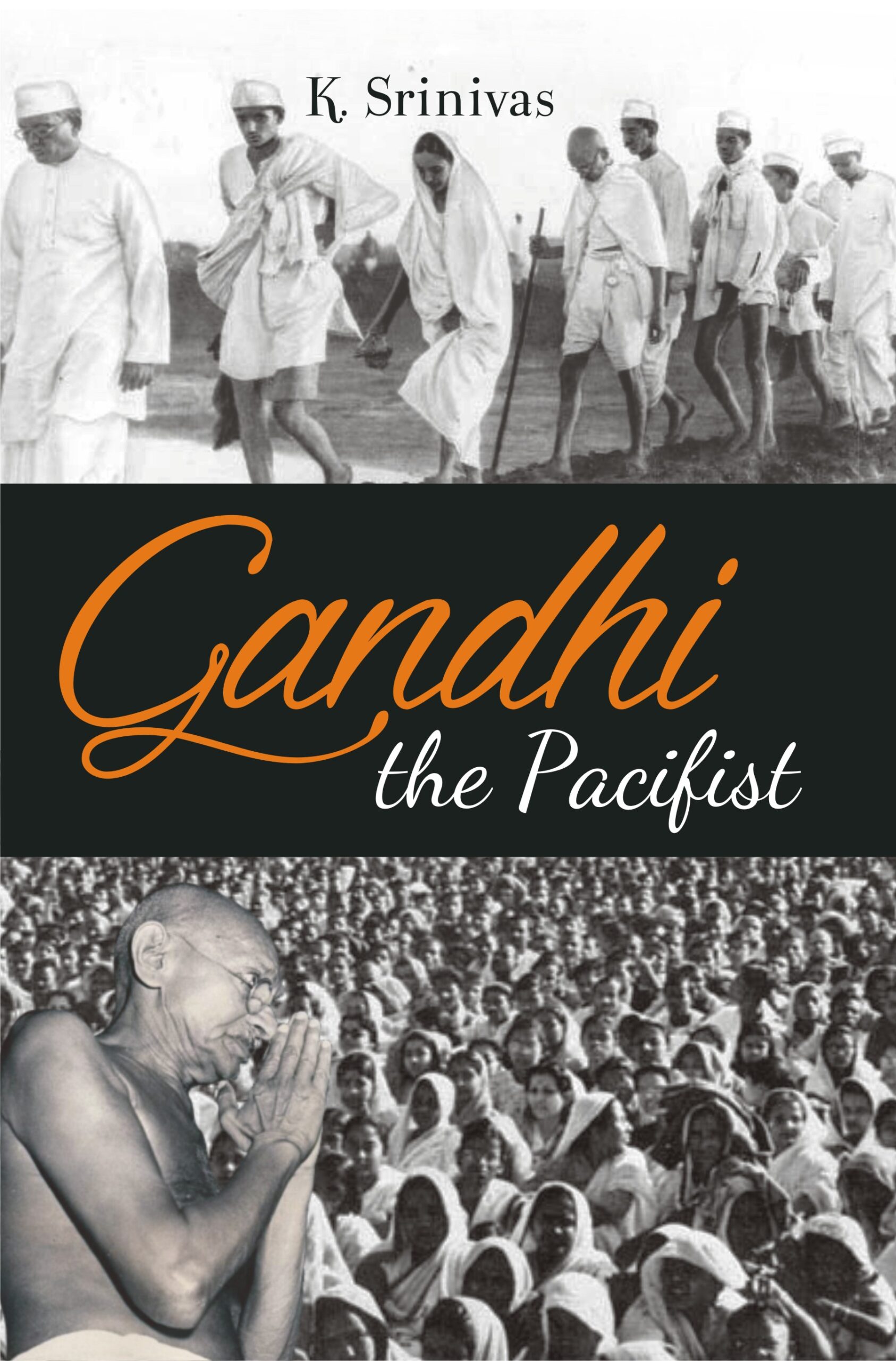
This book portrays Mahatma Gandhi as a philosopher of action (karmayogi), an ideal in which he was deeply rooted, than a philosopher (darshanik). It familiarizes Gandhi to the present generation and reminds us that Gandhian thought in all its aspects is still relevant in facing the challenges of modern consumerist societies.
Mahatma Gandhi has been studied extensively as a multifaceted personality from the backdrop of Indias freedom movement. Volumes have been written about him. His world-view and his ethical and spiritual self-discipline as well made him an unparalleled persona of his time. This book portrays him as a philosopher of action (karmayogi?), an ideal in which he was deeply rooted, than a philosopher (da?rs?anika).
While discerning the Gandhian idealism, this study analytically examines the different qualities of Gandhi such as his firm belief in peace as an embodiment of spirituality, his approach to conflict resolution, his world-view on corruption and human values, his economic philosophy and his outlook on socialism vis-à-vis that of Karl Marx, among others. It also makes an endeavour to reappraise Gandhi in the present-day context.
The book, therefore, attempts to familiarize Gandhi to the present generation and reminds us that Gandhian thought in all its aspects is still relevant in this era of globalization and suggests many ways to overcome or face the challenges of modern consumerism, absorbing the quintessence of a karmayogi?.
This book aims at invoking keen interest among people of different walks of life, be it academia, students, or common populace, who would like to know more about Mahatma Gandhis ever-enticing personality.
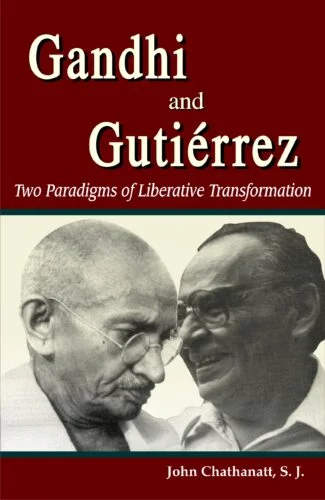
This book examines two paradigmatic figures: Gandhi Mahatma or Father of our Nation, and Gutierrez Father of Liberation Theology. The probe expounds the meaning of liberation, by citing the areas of agreements and differences between them. Consequently they come about as mutually enriching.
This book examines two paradigmatic figures, Mohandas Karamchand Gandhi and Gustavo Gutierrez, both involved in the struggle for liberation in their respective contexts. The former successfully led Indias freedom struggle against the British, evolving in the process a unique paradigm rooted in the religious perceptions. He was called the Mahatma as well as the Father of our nation. The latter attempted to reflect and articulate a theology of liberation in the context of the exploitation prevalent in Latin America, and has been rightly called the Father of Liberation Theology. As we grope today for non-violent, harmonious and effective ways of social transformative action and conflict resolution in a world torn by violence, strife and enmity, a comparative study and a mutual conversation of these two paradigmatic figures can offer enormous insights. This is attempted here in the hope of identifying some features of an economic-political ethics and thus move toward a clearer paradigm of liberative transformation in the Indian context.
The probe shows us the meaning of liberation and the foundational bases of the liberative agenda so as to assess their adequacy, coherence and comprehensiveness of the paradigms used. Areas of agreements as well as points of differences between the two authors are closely looked at. It is found that there are areas at which Gandhi and Gutierrez meet. There are also differences in their social analysis. These differences are significant as they affect their prescriptions for action. There is here a fascinating comparison between the Ahimsatmak Satyagraha of Gandhi and the Drinking From Our Own Wells of Gutierrez. Finally, it is shown that both the thinkers and their systems stand not in opposition to one another but mutually enrich to produce an adequate paradigm of liberative transformation applicable in our contemporary context especially that of India.
Mahatma Gandhi was a universal icon par excellence of truth, integrity, love and compassion. He was an epitome of non-violence, and his fondness for the well-being of humanity knew no bounds. He is the non-violence ambassador of India and Indianness across the globe. Many nations drew – still drawing – spirit and inspiration from him to achieve their freedom and to eradicate many a social malice from their society. He is a legacy of virtue and human value.
This coffee-table book makes one pictiorially travel through the different stages and realms in Gandhi’s life from him being a normal human being to a stature of a mahatma. Rather, from him being a child, a professional young lawyer to a towering personality in Mahatma Gandhi, the Indian political, social and spiritual leader who caused/forced the mighty British to give India, a country which was a treasure house for the British, Independence. It showcases the true image of the different facets of his life.
A mere glimpse across the book, brought out by the Gandhian Society, New Jersey, USA, on the occasion of Gandhi’s 150th birthday, makes one understand what Gandhi was and why is he so special to not only the Indians, but to any sane person throughout the world.
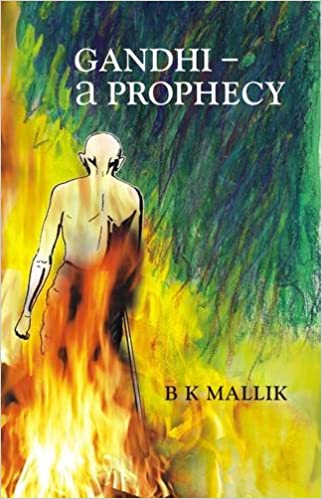
This book written almost immediately after Gandhis demise suggests a fresh view of his struggle to achieve peace in the human home embedded as it is in Malliks socio-philosophical theory of conflict and its avoidance.
This book written almost immediately after Gandhis demise suggests a fresh view of his struggle to achieve peace in the human home embedded as it is in Malliks socio-philosophical theory of conflict and its avoidance. Further in the light of the authors view of the dynamics of history, it reads the life and death of Mahatma Gandhi as more than a mere episode in the milieu of traditional value: it is projected as a significant event which opens up new and unprecedented possibilities for the future of man.
As an original and thought-provoking perspective it should invoke the interest of Gandhians, philosophers and historians alike.
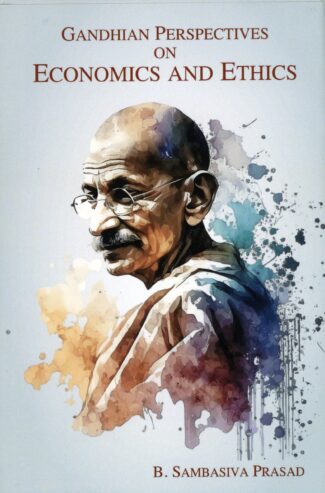
The book explores the ethical foundations of Gandhian economic order and discusses their relevance to the modern times. It also compares Gandhian economic ideals with those of classical thinkers and the modern scholars. The economic ideals and practices of Gandhi are centred round two fundamental principles – truth and non-violence. Gandhian thought, economics and ethics go together.
The book explores the ethical foundations of Gandhian economic order and discusses their relevance to the modern times. It also aims at comparing Gandhian economic ideals with those of classical thinkers like Adam Smith, John Ruskin and Karl Marx, and the modern scholars like Kumarappa, Schumacher, Amartya Sen and John Rawls. The Indian and Western influences, along with British imperialism, have shaped Gandhian economic philosophy. The economic ideals and practices of Gandhi are centred round two fundamental principles – truth and non-violence. Gandhian thought, economics and ethics go together. There is no distinction between them. The relation between economics and ethics works both ways. Gandhian economics is service economy. It is based upon selfless service and altruism. It transforms economics from positive science to normative science. Gandhian economics is not pure economics. It is holistic in nature. To Gandhi, economic questions cannot be isolated. They are interrelated with social, political and religious matters. Gandhian economics is man centred, not money centred. The notions of swaraj, svadeshi, bread labour, aparigraha, trusteeship, sarvodaya, constructive programme, decentralized economy, critique of industrial civilization and economy of permanence are discussed, under the backdrop of Gandhian economics. Finally, an estimate of Gandhian economic order is presented. Economic transformation is possible when there is a change from economic man to Gandhian man; if not, Gandhi’s dream of economic order will remain as a pipedream.
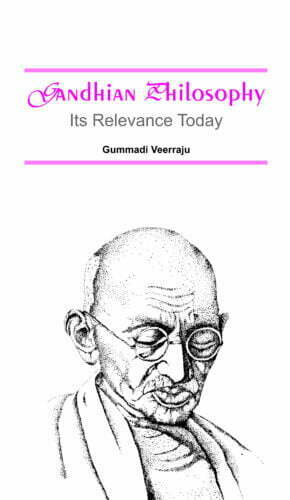
Retrieving a range of Gandhis social, economic, moral, spiritual, cultural and political ideas from various sources, this work gauges the relevance of Gandhi and Gandhism in the dehumanized, fragmented world of moral decay and unbridled consumerism.
Gandhi (1869-1948) held no political office. Yet he could arouse the conscience of an entire subcontinent! A lean, frail, half-naked fakir armed with a wooden staff and simple dignity of a human being, he fought against the greatest empire, the world has known. It was just the moral grandeur of his soul which enabled him to fight against brute power, in any form, even vanquish it. Generations to come will scarce believe that such a one as this in flesh and blood walked upon this earth, said Professor Einstein of him. A saint, social activist and political philosopher, unlike any other known in the twentieth century, Mohandas Karamchand Gandhi held out a message which, based on a series of his experiments with truth, touched upon every domain of human life: social, economic, moral/spiritual, cultural, political. Retrieving a range of these ideas from a variety of sources, this book tries afresh to gauge how far Gandhi and Gandhism are relevant in this dehumanized, fragmented world, perched dangerously on stockpiles of all-devastating arsenal; or in this age of distrust, moral decay and unbridled consumerism; or yet again when seen against todays aggressive/retaliatory attitudes, or against the growing cult of violence. The book is not just a revalidation of Gandhian philosophy, but a reminder as well, suggesting how in his abiding solutions alone: with their eloquent underpinnings of truth, non-violence and service of humanity, lies the hope for mankind in this conflict-ridden world.
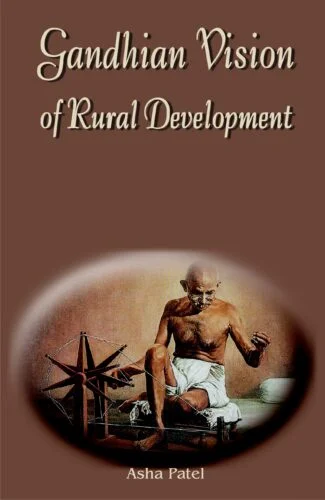
Contemporary relevance of Gandhian economic thought, focussing on Rural Industrialization, and its suitability as a panacea for extant economic problems by critically analyzing various Gandhian approaches along with his vision of Gram swarajya forms the central theme of this work.
The contemporary relevance of Gandhian economic thought with special focus on the rural industrialization forms the central theme of this book. Policies related to planned economy after Independence have not brought the desired changes. Uncontrolled, unplanned and un-regulated industrialization and urbanization have led to many disastrous consequences. In view of this, the book explores the suitability of Gandhian model as a possible remedy for the various economic problems in developing societies. Thus, various Gandhian approaches have been critically analysed with regard to rural and farm development, utilization of human labour and their skill, development with equity, decentralized development, his vision of Gram Swarajya etc. The book also brings out the various facets of the different voluntary organizations working in this area and their constructive contribution. The book, undoubtedly, is a meaningful contribution to the study of Gandhian economic thought. This will be very useful to the students at under-graduate and post-graduate level. This would also serve as a reference book for researchers, Gandhian and Sarvodaya institutions. This will be quite helpful to decision makers in framing and implementing agricultural, industrial and environmental policy.
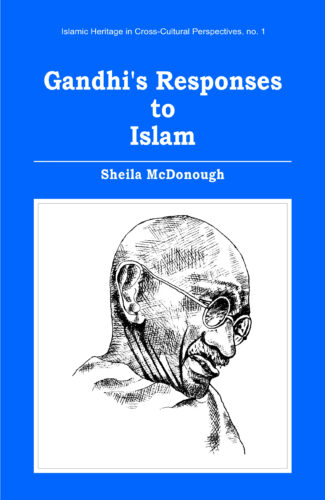
In this first-ever study exploring exclusively Gandhis attitude to Islam, the author puts together many of Gandhis observations about Prophet Mohammed, the holy Quran, and the Islamic faith.
Look at him as we may: whether as an exceptional human being, a modern-age prophet, a unique politician, or a charismatic leader of non-violent movement, Gandhis many-sidedness is proverbial. And, then, he was a religious genius as well with genuine tolerance and respect for all mankinds faiths. Here is the first ever study exploring exclusively Gandhis attitude to Islam, from his childhood to the last years of his phenomenally eventful life. In thematically focussing on his responsiveness to Islam, Dr. Sheila McDonough addresses a vital question: Why did Gandhi say the things, he did, about Islam? Which leads her to meticulously trace, among other determinants, the intellectual influences that had helped shape Gandhis vision of Islam the vision he particularly shared with many of his Indian contemporaries. The author, a widely known authority on Islamic Studies, puts together many of Gandhis observations about Prophet Mohammed, the holy Quran, and the Islamic faith to emphasize that his positive, respectful response to Islam was not a matter of political pragmatism, nor a facade to unify Indians at a critical period of their history, but it went far beyond to a philosophical understanding of the very essence of Islam. Unfailingly convincing, Prof. McDonough combines, in her writing, a rare scholarship with readability that makes her book at once fascinating to both specialists and common readers anywhere in the modern world.

An Interdisciplinary, international journal, GITAM Journal of Gandhian Studies focuses on Mahatma Gandhi as one of the persona gratissima of modern age Þ his thought and practices, his ideas and their applications, peace and nonviolence. It publishes research papers; critical, constructive and scholarly reviews and discussions, etc.
Gitam Journal of Gandhian Studies is an interdisciplinary, international journal of Gandhian thought and practices, peace and non-violence. It publishes articles on Gandhi, his ideas and their application in the context of real-world problems and their resolution, ranging from rural development to global peace and from personal transformation to social change. It covers among other areas politics and public welfare, philosophy and values, education and personal growth, non-violence and conflict resolution. The Journal encourages critical, constructive and scholarly reviews and discussions with the goal of understanding the relevance and application of the Gandhian concepts and models.
In addition to research papers, the Journal publishes book reviews and readers comments, review articles of seminars and conferences, as well as calendar of events worldwide relating to Gandhi, non-violence and peace appear regularly in the Journal.

An Interdisciplinary, international journal, GITAM Journal of Gandhian Studies focuses on Mahatma Gandhi as one of the persona gratissima of modern age Þ his thought and practices, his ideas and their applications, peace and nonviolence. It publishes research papers; critical, constructive and scholarly reviews and discussions, etc.
Gitam Journal of Gandhian Studies is an interdisciplinary, international journal of Gandhian thought and practices, peace and non-violence. It publishes articles on Gandhi, his ideas and their application in the context of real-world problems and their resolution, ranging from rural development to global peace and from personal transformation to social change. It covers among other areas politics and public welfare, philosophy and values, education and personal growth, non-violence and conflict resolution. The Journal encourages critical, constructive and scholarly reviews and discussions with the goal of understanding the relevance and application of the Gandhian concepts and models.
In addition to research papers, the Journal publishes book reviews and readers comments, review articles of seminars and conferences, as well as calendar of events worldwide relating to Gandhi, non-violence and peace appear regularly in the Journal.
| There are no products |